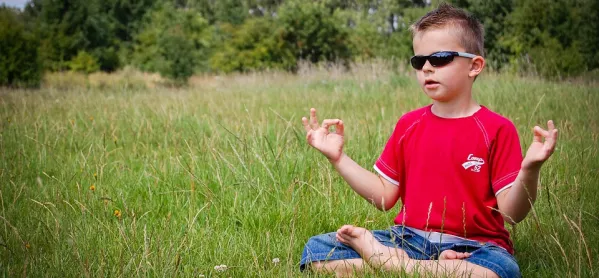Schools should be measured not just on pupils’ academic progress, but on how pupils’ wellbeing progresses, MPs heard today.
Lord Layard, director of the Well-Being Programme at the London School of Economics, this morning told a cross-party group of MPs that it was important that heads and teachers understood how pupils’ mental health evolves during their time at school.
“Let’s encourage schools to measure the wellbeing of their children,” he said. “And let’s not judge schools by the wellbeing of their children - because they all have different intakes - but by the difference they’re making to their wellbeing while they’re there.”
Lord Layard, who was the government’s happiness tsar under Tony Blair, was addressing a joint meeting of the Commons education and health committees, during which they were discussing the role of education in young people’s mental health.
Addressing the committee, Baroness Tyler of Enfield, the chair of the values-based child and adolescent mental-health system commission, also suggested that MPs needed to rethink the way that schools are assessed.
She said: “When it comes to judging how well a school is doing, it’s absolutely vital that those who are judging - Ofsted - are looking at academic achievement and wellbeing, and the links between the two. And I think it’s the links between the two that are being overlooked at the moment.”
Also addressing the committee were Natasha Devon, Tes columnist and former government mental-health champion, and Peter Hindley, consultant child and adolescent psychiatrist at St Thomas’s Hospital, London.
The committee also heard the following recommendations:
- Every school should have on-site child and adolescent mental-health services
At the moment, Lord Layard said, only 25 per cent of children in psychological need are receiving specialist help. If a new wing of child and adolescent mental-health services was based on school grounds, Lord Layard estimates that an additional 200,000 children could receive mental-health support.
- Every school should have a PSHE “missionary”
Lord Layard called on all secondaries to have at least one teacher on staff who specialised in PHSE during training. “There should be at least one teacher in every school who specialised in PSHE and is a missionary for the subject,” he said.
- Include references to mental health in everyday lessons
Analysis of Hamlet, for example, could involve discussion of insomnia and psychosis. Making mental ill health a part of lesson-time discussion helps to break down the stigma surrounding it.
- Acknowledge teachers’ difficulties
Ms Devon pointed out the irony of a system that puts teachers and pupils under constant pressure, and yet also expects them to incorporate mindfulness - letting go and appreciating the moment - into the timetable. “If you’re going to implement mindfulness, you have to create an environment where that’s possible,” she said.
- School funding matters to mental health
When budgets are cut, enrichment programmes - such as sport, drama, music and debating - are often the first things to be cut. Yet these activities have been shown to promote mental health.
- Don’t overload teachers
“There’s a tendency to underestimate that teachers are ready to snap,” Ms Devon said. “So much is thrown on teachers. That’s part of the reason why we have such an epic retention problem in the profession.”
- Treat social media like soft drugs
“Social media is an intimate part of young people’s and children’s lives,” said Dr Hindley. “In some cases, it can be very helpful, and in some cases it can be damaging. Recreational drugs are another example of that.”
- Don’t underestimate pupils’ resourcefulness
Natasha Devon spoke of visiting one school where mobile phones had to be handed in during the day. “They all had two or three mobile phones to get around that,” she said. She also referred to a schoolboy who took precisely 30 seconds to circumnavigate all the parental locks and firewalls on a laptop, by Googling the Spanish word for “pornography”.
Want to keep up with the latest education news and opinion? Follow Tes on Twitter and like Tes on Facebook




